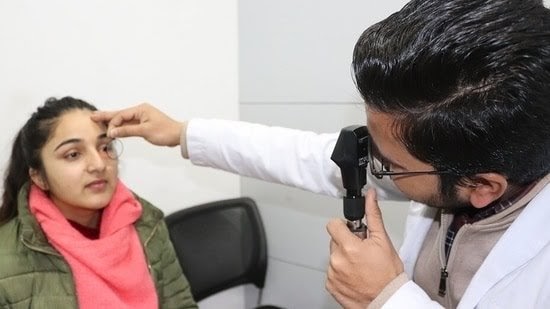Study finds screen time linked to risk of myopia in young people

A new study has revealed a link between screen time and higher risk and severity of myopia, or short-sightedness, in children and young adults.
The open-access research was undertaken by researchers and eye health experts from Singapore, Australia, China and the UK, including Professor Rupert Bourne from Anglia Ruskin University (ARU).
The authors examined more than 3,000 studies investigating smart device exposure and myopia in children and young adults aged between 3 months old and 33 years old.
After analysing and statistically combining the available studies, the authors revealed that high levels of smart device screen time, such as looking at a mobile phone, is associated with around a 30 per cent higher risk of myopia and, when combined with excessive computer use, that risk rose to around 80 per cent.
The research comes as millions of children around the world have spent substantial time using remote learning methods following the closure of schools due to the COVID-19 pandemic.
Professor Bourne, Professor of Ophthalmology in the Vision and Eye Research Institute at Anglia Ruskin University (ARU), said, “Around half the global population is expected to have myopia by 2050, so it is a health concern that is escalating quickly. Our study is the most comprehensive yet on this issue and shows a potential link between screen time and myopia in young people.”
“This research comes at a time when our children have been spending more time than ever looking at screens for long periods, due to school closures, and it is clear that urgent research is needed to further understand how exposure to digital devices can affect our eyes and vision,” Professor Bourne added.
“We also know that people underestimate their own screen time, so future studies should use objective measures to capture this information,” Professor Bourne concluded.
This story has been copy-paste from a wire agency without modifications to the text.

A new study has revealed a link between screen time and higher risk and severity of myopia, or short-sightedness, in children and young adults. The open-access research was undertaken by researchers and eye health experts from Singapore, Australia, China and the UK, including Professor Rupert Bourne from Anglia Ruskin University…
Recent Posts
- Major website hijacking scam sees over 35,000 sites attacked, redirected to gambling sites, so be on your guard
- The ups and downs of the iPhone 16E
- The US Is Considering a TP-Link Router Ban—Should You Worry?
- There’s Nothing left to hide as leaked videos reveal the Phone 3A in full
- North Korean hackers are posing as software development recruiters to target freelancers
Archives
- February 2025
- January 2025
- December 2024
- November 2024
- October 2024
- September 2024
- August 2024
- July 2024
- June 2024
- May 2024
- April 2024
- March 2024
- February 2024
- January 2024
- December 2023
- November 2023
- October 2023
- September 2023
- August 2023
- July 2023
- June 2023
- May 2023
- April 2023
- March 2023
- February 2023
- January 2023
- December 2022
- November 2022
- October 2022
- September 2022
- August 2022
- July 2022
- June 2022
- May 2022
- April 2022
- March 2022
- February 2022
- January 2022
- December 2021
- November 2021
- October 2021
- September 2021
- August 2021
- July 2021
- June 2021
- May 2021
- April 2021
- March 2021
- February 2021
- January 2021
- December 2020
- November 2020
- October 2020
- September 2020
- August 2020
- July 2020
- June 2020
- May 2020
- April 2020
- March 2020
- February 2020
- January 2020
- December 2019
- November 2019
- September 2018
- October 2017
- December 2011
- August 2010